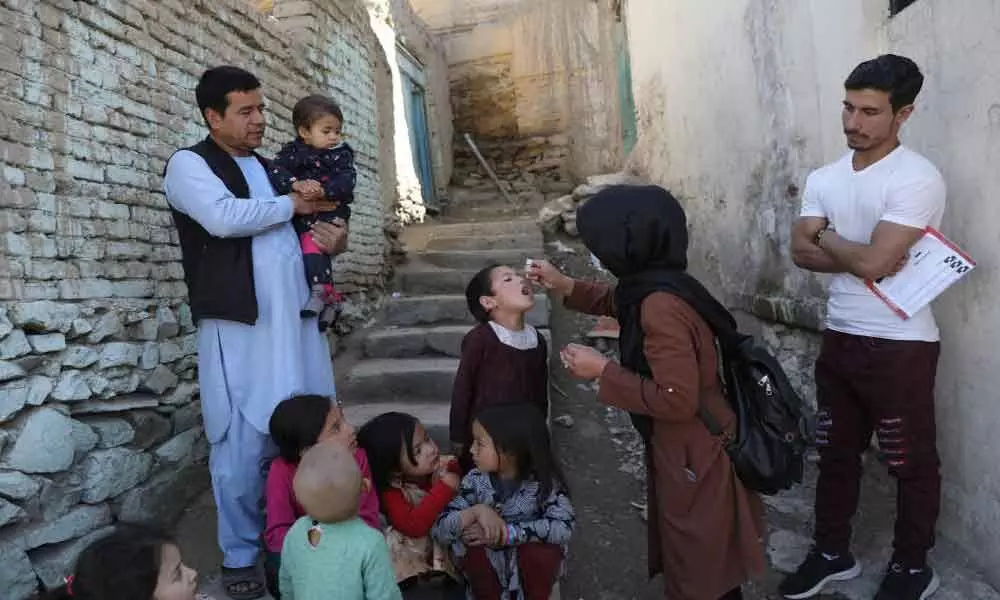Live
- Dhivyabharathi promises an unforgettable experience with ‘Kingston’
- India remains a bright spot in global GDP growth trajectory: Economists
- Director Kiruthiga Udhayanidhi encourages actors to embrace bold roles
- ‘Fateh’ review: Feast to action lovers
- Samantha overcomes health setbacks; shares updates on social media
- Kejriwal swindled Rs 2,026 cr through liquor scam, shows CAG report
- Angola reports 119 cholera cases, including 12 deaths
- Splash Colors Media, Alinea Avighna Studios, and Settle King Begin Shooting for Production No. 1
- South Korea: Black boxes of crashed Jeju Air plane missing final four minutes of data
- Five youths drowns to death in Kondapochamma Sagar dam
Just In
Nationwide polio eradication campaign starts in Afghanistan


FILE PIC - Shabana Maani, gives a polio vaccination to a child in the old part of Kabul, Afghanistan, March 29, 2021.
For the past three years before taking control of Afghanistan, the Taliban had barred UN-organised vaccination teams from doing door-to-door campaigns in parts of the country under their control.
The Taliban-run Afghan public health ministry announced Sunday the start of a four-day nationwide polio vaccination campaign aimed at inoculating children under age 5. For the past three years before taking control of Afghanistan, the Taliban had barred UN-organised vaccination teams from doing door-to-door campaigns in parts of the country under their control. The group apparently was suspicious the team members could be spies for the previous government or the West. Because of the ban and ongoing fighting, some 3.3 million children over the past three years have not been vaccinated.
"Without any doubt, polio is a disease that without treatment will either kill our children or cause them with a permanent disability, so in this case, the only way is to implement the vaccination," said Dr. Qalandar Ebad, the Taliban's acting public health minister.
Afghanistan and neighboring Pakistan are the only countries in the world where polio remains endemic and the disease can cause partial paralysis in children. Since 2010, the country has been carrying out regular inoculation campaigns in which workers go door to door, giving the vaccine to children. Most of the workers are women since they can get better access to mothers and children.
The four-day campaign will start Monday and take place countrywide, Ebad said. The estimated target population is Afghanistan's 10 million children under age 5, including the more than 3.3 million who could not be reached since 2018.
"Vaccination of (children) less than five years of age in the country during the national immunization days is a gigantic task. It is not possible for the ministry of public health alone to complete this task successfully, so we need the support of all lined departments," said Nek Wali Shah Momin, a health ministry official in the polio eradication department. The Taliban's reported endorsement of the campaign appeared aimed at showing the international community they are willing to cooperate with international agencies. The longtime militant insurgent force has been trying to win the world's recognition of its new government and re-open the door for international aid to rescue the crumbling economy.
The World Health Organisation and the UN children's agency UNICEF in a joint statement last month said they welcomed the decision by the Taliban leadership supporting the resumption of house-to-house polio vaccinations across the country.
Large sections of the country have been out of reach for vaccinations in recent years. In parts of the south, particularly, the ban by the Taliban was in effect. In other areas, door-to-door campaigns were impossible because of fighting between the government and insurgents, or because of fears of kidnappings or roadside bombs. In some places, hard-line clerics spoke out against vaccinations, calling them un-Islamic or claiming they were part of a Western plot.

© 2025 Hyderabad Media House Limited/The Hans India. All rights reserved. Powered by hocalwire.com






